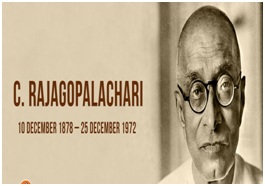

Context
Prime Minister Narendra Modi paid tributes to freedom fighter and statesman C. Rajagopalachari on his 143rd birth anniversary.
About
About C. Rajagopalachari 
- C Rajagopalachari, also known as Rajaji or C.R.,was born on 10 December 1878 in Thorapalli Agraharam, Krishnagiri District in Tamil Nadu.
- His father Chakravarti Venkataryan was the munsiff of Thorapalli, who with his wife Singaramma had two other sons apart from Rajagopalachari.
- Rajagopalachari studied in elementary schools at Thorapalli and Hosur and passed his matriculation in 1891.
- In 1894, he secured a BA in Arts from Central College in Bangalore.
- In 1897, he graduated in law from the Presidency College, Madras.
- He married Alamelu Mangalamma in 1897 and had five children.
- Later, his daughter Lakshmi married Devdas Gandhi, son of Mahatma Gandhi.
- He started his legal career in Salem, Tamil Nadu in 1900 where he got interested in politics and society.
- In 1911, he became a member of the Salem Municipality.
- He also served as its chairman from 1917 to 1919. It was during his tenure as chairman that the municipality got its first Dalit member, and Rajagopalachari had a big role in this development.
- He was conferred the Bharat Ratna in 1955.
- He passed away on 25 December 1972 aged 94.
Role during the Independence Struggle
- He joined the Indian National Congress in 1906 and participated in the 1906 Calcutta session.
- After that, he became more involved in national politics. He took part in the anti-Rowlatt Act agitations.
- Referred to as ‘my conscience keeper’ by Gandhi, he became one of the early followers of Mahatma Gandhi after Gandhi joined the Indian Independence Movement.
- He quit his legal practice and took part in the non-cooperation movement.
- In 1921, he became the party’s General Secretary.
- He led the group of NO-CHANGERS e. individuals against contesting elections for the Imperial Legislative Council and other Provincial Councils against PRO-CHANGERS.
- NO-CHANGERS won the motion in the Indian National Congress against PRO-CHANGERS which led to the resignation of Pandit Motilal Nehru and C.R.Das.
- He was involved in the Vaikom Satyagraha Movement against untouchability during 1924-25.
- When Gandhi was leading the Dandi March in 1930, Rajagopalachari made a similar march at Vedaranyam and defied the salt laws. For this, he was arrested.
- He became the President of Tamil Nadu Congress Committee in 1937.
- As premier, He issued the Temple Entry Authorization and Indemnity Act 1939 and removed restrictions on Dalits entering Hindu temples.
- He was instrumental in convincing the Indian National Congress to participate in the 1937 general elections.
- He resigned from premiership when the Viceroy declared India to be a party to the Second World War without duly consulting Indians. He was arrested in December 1940.
- He also offered a resolution to the INC-Muslim League impasse over the issue of partition in the form of the C.R. Formula.
Post Independence
- He was the Minister of Industry, Supply, Education and Finance in Jawaharlal Nehru’s interim government from 1946 to 1947.
- He was also the Member of Constituent Assembly where he was the part of Advisory Committee and Sub-Committee on Minorities.
- He was the first Governor of West Bengal after the partition of India in 1947.
- He also acted as the Acting Governor-General of India in the absence of Lord Mountbatten in November 1947.
- He became the first Indian Governor-General of India and the last Governor-General of India when he served between June 1948- 26 January 1950.
- He also served as the Home Affairs Minister for 10 months from December 1950.
- He was against Linguistic States as he considered they would act against the Unity of India.
- During his tenure Andhra Pradesh, a Telugu speaking state was created after division from Madras Presidency in 1953.
- His government became more unpopular when he introduced the controversial Modified System of Elementary Education and later he resigned as CM in 1954.
- In 1957 he resigned from the Congress Party and in 1956 founded the Swatantra Party along with Murari Vaidya and Minoo Masani.
- He was against Soviet Socialism and also coined the term ‘License-Permit Raj’.
- In 1967, Swatantra Party in an alliance with the DMK and the Forward Bloc won the Madras Assembly Elections and ousted the Congress in Madras for the first time in 30 years.
- Swatantra Party also became the single largest opposition party in the Lok Sabha in 1967 elections.


